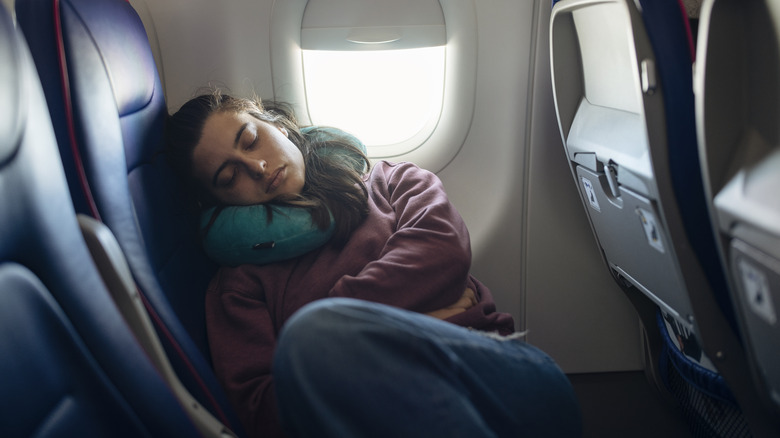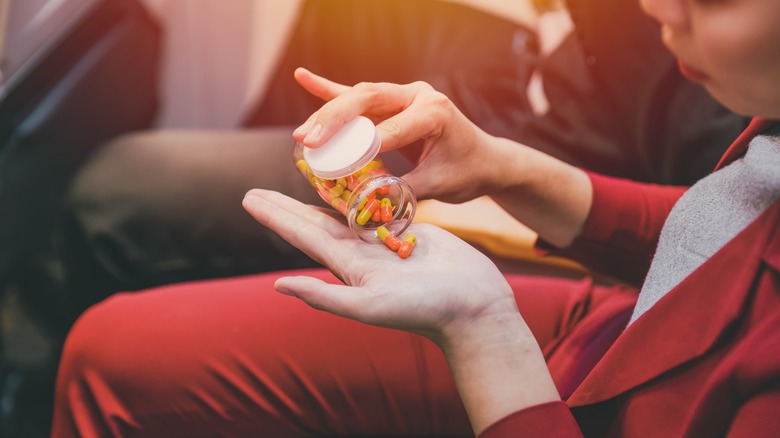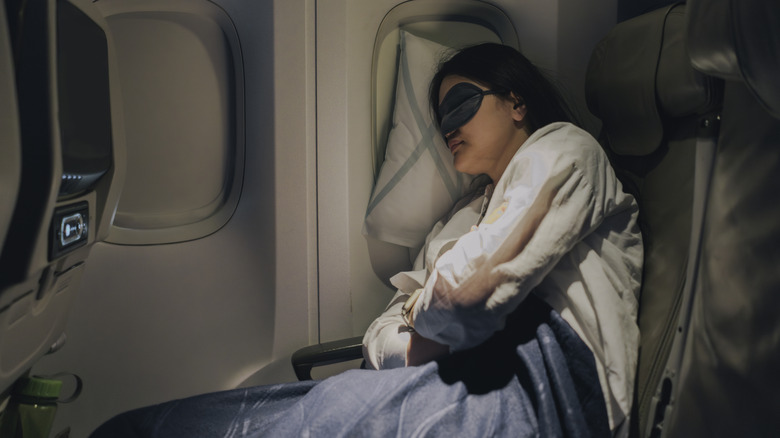Is It Unsafe To Take Sleeping Pills On A Plane?
Traveling almost always means tossing your sleep schedule and routine right out the window. Heading to some far-flung destination? Get ready for some major adjustments, especially if you're hopping across multiple time zones and have no choice but to fight jetlag. Even domestic flights aren't safe, as an overly delayed flight could leave you figuring out how to sleep comfortably in the airport. It's no wonder there's a long list of so-called tips for sleeping on a plane, with some folks swearing by sleeping pills to knock themselves out for the entire flight. But just because you can, doesn't mean you should. It still depends on the situation.
Clinical psychologist and sleep specialist Michael Breus advises against popping sleeping pills, especially if you're a newbie. "It's not something to be messing around with," he told CNN. "You don't know how you're going to react to it, or if it might interact with any of your existing medications." Meanwhile, Jamie M. Zeitzer, co-director of Stanford University's Center for Sleep and Circadian Sciences, told National Geographic that if you've been prescribed something like Ambien and know how to take it, you'll likely be fine using it for a long-haul flight. "It's worse to have anxiety keep you from sleeping and having that ruin your trip," he said.
Some sleeping pills have dangerous side effects
Unlike flight attendants with their dedicated sleeping spots, passengers are left with the seats they booked. Some of us get creative, lugging neck pillows and light-blocking eye masks, while others resort to sleeping aids. A crowd favorite? Antihistamines like Benadryl and Advil PM. Sure, they might knock you out on a random Tuesday night, but according to Dr. Chester Wu, a double-board certified Psychiatry and Sleep Medicine specialist, they're not exactly a traveler's best friend. "It may come with side effects like dizziness, dry mouth, constipation, headaches, and loss of appetite, as well as next-day grogginess that will exacerbate many of the discomforts of sleep loss and jet lag that already come with travel," he shared with Well + Good, noting that you might still feel grogginess the next day. Even if you do manage to doze off, your sleep won't end up being the "restorative, 'naturalistic' sleep that will help you feel refreshed on arrival."
If you think prescription sleeping aids like Ambien are better, think again. Dr. Julie Holland, a psychopharmacologist, told CNN that these meds can give you "Teflon" brain, leaving you in a zombie-like state, unable to form new memories. Combine them with alcohol, and things get even messier, with flight attendant Betty Thesky telling BBC, "I've seen grown men lie down on the floor and stick their head in the aisle. It's dark in the cabin; someone is going to step on your face! I see that all the time."
Safer sleeping aids that you can try
Just because sleeping pills are not a fool-proof and entirely safe option doesn't mean all hope is lost for catching some in-flight Zzz's. If you're keen on trying sleeping aids, popping a melatonin pill is an option. Your body already naturally produces melatonin anyway, so taking a supplement can help you get drowsy faster. You can even take it days before your scheduled flight, per primary care and social medicine doctor Nate Favini. "Melatonin is a totally natural and safe supplement that is effective for sleep and jet lag," he shared with The Points Guy. "You can take melatonin at the time you plan to go to bed in the time zone you are traveling to for a few nights before you travel... It can also be taken to help with sleep while you're on a plane."
To maximize your in-flight snooze potential, wear comfortable clothes, choose a seat that allows for better sleeping positions (window, obviously), and invest in quality pillows, noise-canceling headphones, and blackout masks. And if, despite all this, sleep still eludes you, don't sweat it. As long as you're cozy and relaxed, you're doing fine.
"Don't underestimate the power of rest. Don't get too caught up in 'I need to sleep,' " Ellen Wermter, a board-certified family nurse practitioner and Better Sleep Council spokesperson, told The Washington Post. "If you sleep, great. If you don't, you're still getting benefits from closing your eyes and getting quiet time."


